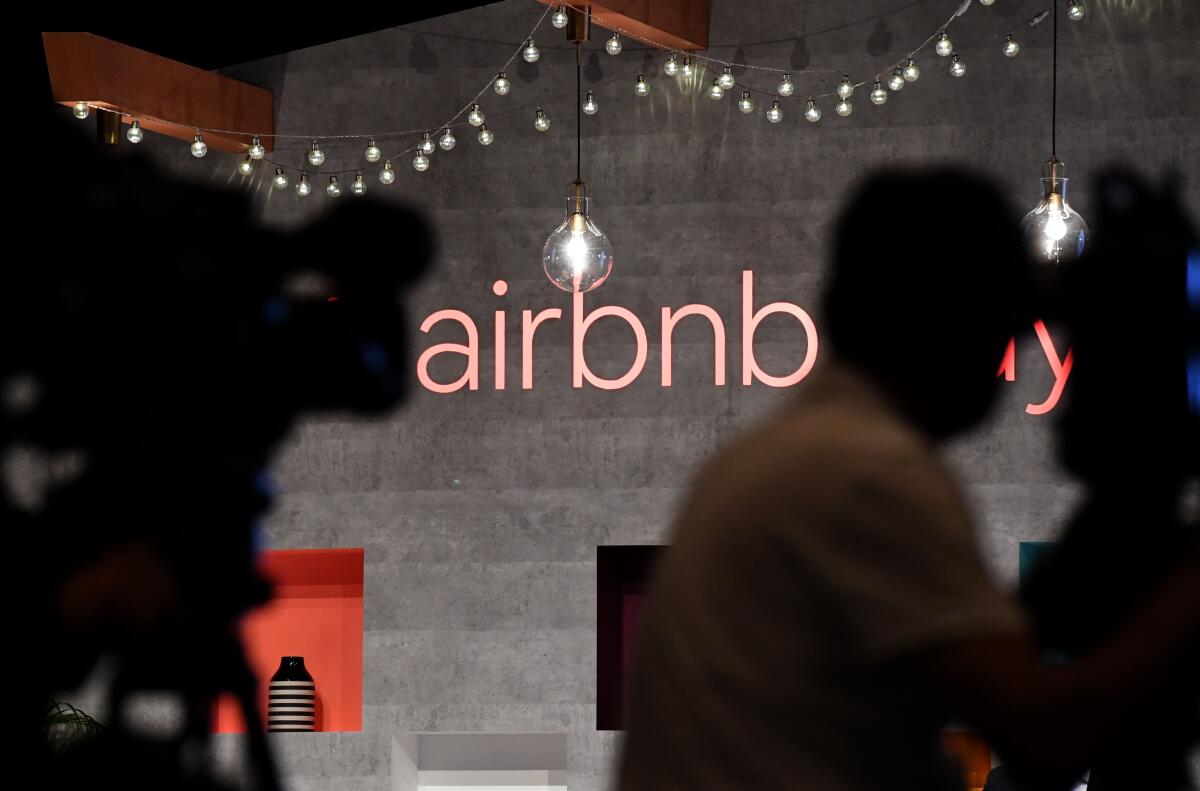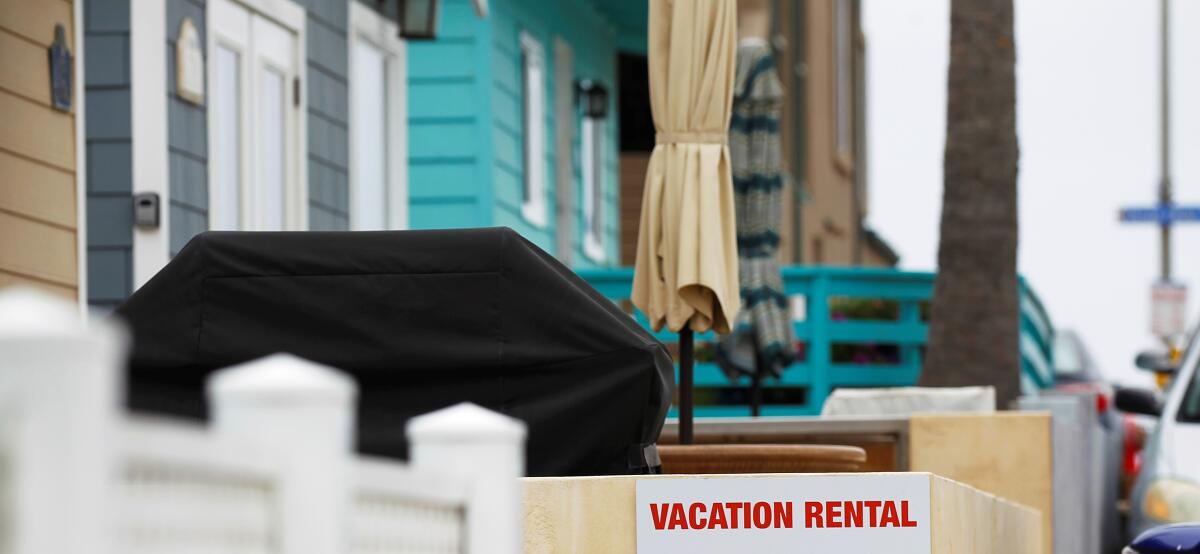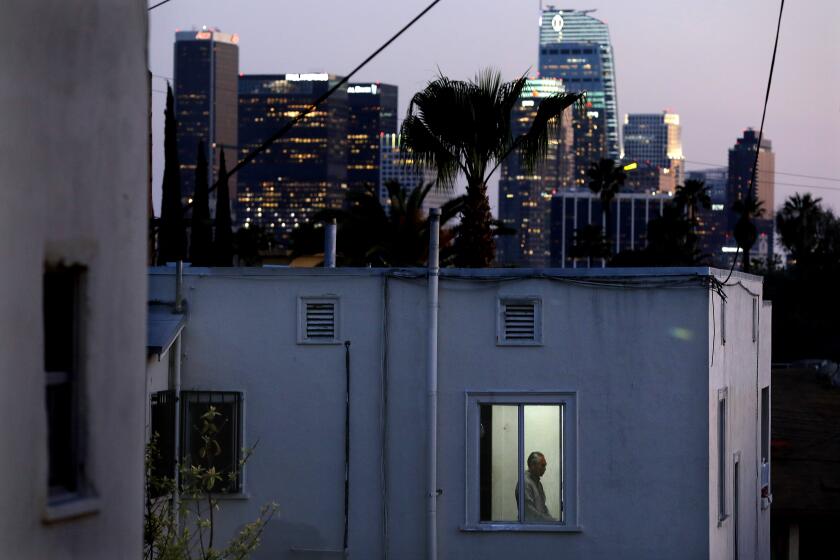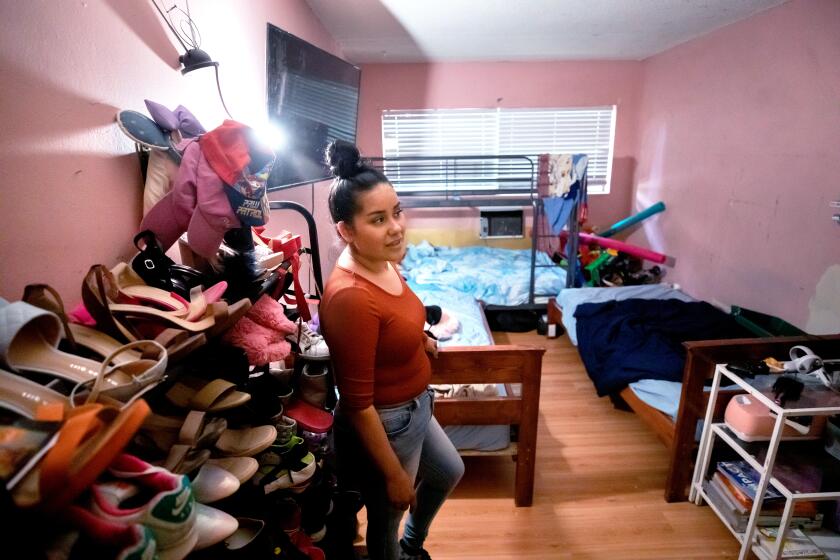L.A. Airbnb hosts are charging higher rates and raking in big payouts amid city crackdown

- Share via
Running an Airbnb in L.A. has never been more profitable.
As the city tries to crack down on illegal listings, and advocacy groups complain about the company’s effect on L.A.’s housing crisis, hosts are charging higher rates than ever while raking in bigger and bigger payouts.
But don’t expect them to talk about it.
Data show that a vast number of homes are operating without an active registration, which is required by the city to operate a short-term rental. Several such hosts spoke to The Times anonymously for fear of being fined by the city or, worse, getting their listing shut down by Airbnb.
“This is my primary source of income,” said one host who operates three different listings. “I’m finally making a decent living off of this. One listing alone wouldn’t cut it.”
Since 2020, revenues for hosts have steadily risen far beyond pre-pandemic levels. The average revenue climbed to $17,654 in 2022, up more than $4,000 year-over-year, and the numbers are at a similar pace for 2023, according to data from short-term rental analytics company AllTheRooms.
In total, L.A. hosts earned a combined $375 million last year, a spokesperson for Airbnb said.
A few factors contribute to the rise. For one, daily rates for Airbnb rentals have spiked over the last four years, swelling from $152 in 2019 to $244 in 2023. It’s a trend that’s happening across the short-term rental industry, as hotel and VRBO rates have steadily risen since the COVID-19 pandemic as well.
Basic supply and demand is another factor. Save for a drop during the first few months of the pandemic, Airbnb occupancy rates have largely stayed consistent, with the average rental occupied more than 40% of the time. But the amount of listings has dropped dramatically.
In August 2019, there were 16,973 Airbnb listings in L.A. Currently, there are 7,360.
Supply is down for now, but advocates worry that if revenues continue to rise, more homeowners will convert properties into Airbnbs.
As the L.A. rental market soars out of reach for many working families, one community wants to hold on to its low-cost housing.
Much of the drop was due to the pandemic, but the supply hasn’t risen since 2020 partly due to the city’s enforcement of its Home-Sharing Ordinance, a law that went into effect in 2019 that limits Angelenos to hosting only short-term rentals in their primary residence — homes where they can prove they live at least six months per year.
L.A. and Airbnb have worked in tandem over the years to enforce the law, launching a system in 2020 that streamlines the process of identifying and taking down illegal short-term rental listings.
It has been effective; the number of listings for short-term rental units across all home-sharing sites has dropped more than 70% over the last four years, going from roughly 36,600 in November 2019 to just under 10,000 in June 2023, according to the city planning department.
But plenty remain.
The Times previously reported that thousands of listings violate the law, and last year, a report claimed that 22% of L.A. listings host guests for more than 180 days a year.
“I can’t afford to rent out my place for only six months a year. I’d lose half my revenue,” said one host who rents a two-bedroom apartment in Hollywood on Airbnb.
Two other Airbnb hosts hung up the phone mid-interview when asked about whether their listing was their primary residence, or whether their registration number was valid.
“It’s a don’t ask, don’t tell system. I can’t afford to have my business threatened over a registration number,” one said.

As of August, there are 4,293 active home-sharing registrations, according to the city’s planning department. But on Airbnb alone, there are currently 7,360 listings up for rent.
“L.A. has a big enough rent problem on its own, and then you have a rogue industry that swoops into the city and starts taking rental properties off the market,” said Peter Dreier, a professor at Occidental College.
Dreier worked with the team that drafted Measure ULA, a new tax that funnels money toward affordable housing initiatives, and said that the short-term rental industry is contributing to both the housing crisis and homelessness crisis.
“When you take units off the market and rent them to tourists, one consequence is that it leads to more people fighting over fewer units. And that leads to higher rents,” he said.
The planning department is preparing a report with other departments analyzing enforcement of the Home-Sharing Ordinance. It will provide recommendations to the City Council on how to improve the program.
In the meantime, more listings bring more tax dollars. L.A. charges a 14% transient occupancy tax, often called a “bed tax,” paid by guests in a hotel or a short-term rental such as an Airbnb.
In the 2021-22 fiscal year, the city collected $33.88 million in transient occupancy taxes, according to the planning department.
It’s a hefty amount, but a report from McGill University urban planning professor David Wachsmuth suggests that the city could be raking in even more by fining illegal short-term rental listings.
The study claimed that 45% of all short-term rental listings are illegal in one way or another, and that the city could have levied between $56.8 million and $302.2 million in fines in 2022.
“I’ve never paid a fine, but my guests pay the tax. As long as the city’s getting money from somewhere, they’ll be fine,” said the Hollywood Airbnb host.
Randy Renick, an attorney with Hadsell Stormer Renick & Dai LLP, serves as executive director of Better Neighbors LA, a coalition that includes hotel employees, renters’ rights groups and housing advocates. He co-founded the group in 2019 as a public education campaign to emphasize the impact that short-term rentals have on communities.
New census data reveals over a quarter of U.S. households had solo occupants in 2020, more than three times the 1940 estimate and more than twice the 1960 level.
He said rental hosts bend the rules in a few ways. One strategy is the bait-and-switch, where a host will advertise that a property is somewhere near the border of Los Angeles, such as West Hollywood, and thus not subject to L.A.’s stringent rules. But when renters show up, the property is actually in L.A.
Others give false registration numbers — some more cleverly than others.
“1234567 was popular for a while,” Renick said.
Some simply use expired registration numbers, and others used an active registration number but for several properties.
The organization’s website keeps a hotline for Angelenos to call and report illegal listings in their neighborhood, and Renick said they receive multiple calls per week.
From there, they urge the city to take action for matters both small and large. Sometimes it’s a call asking to enforce a fine on a certain property, and sometimes it’s a campaign on how short-term rentals can drive up long-term rent in an area by taking homes off the market and renting them to tourists.
“We try to show the impact of short-term renting and how it’s contributing to the housing and homelessness crisis,” Renick said. “Robust enforcement will result in returning thousands of units back to long-term rental.”
He pointed to Santa Monica and New York City as two cities that L.A. could model itself after. Santa Monica has a robust enforcement system, including multiple full-time staff focused on interviewing owners and issuing fines to illegal listings.
The coastal city allows only short-term rentals (less than 30 days) if the host lives on the property throughout the visitor’s stay. New York City adopted a similar rule last year, and the enforcement begins on Tuesday.
Though it has a long way to go, Renick said L.A. has raised the bar on proof required to show that a listing is the host’s primary residence.
Frank Tai, the owner of a luxury beachfront rental in Playa del Rey, has seen that process firsthand. He has only one listing and makes sure to renew his license every year, but the process has gotten more laborious over the years as both the city and Airbnb look to catch illegal listings.
“I’m in compliance, but it’s a lot of work. I fill out a 40-page application every year and send in property tax statements, utility bills and other documents,” he said. “Every year, something gets kicked back. They’re trying to stay on top of things.”
Tai said the process is well worth it. His rental is very profitable; it’s booked throughout the entire summer, and nightly rates double during vacation season. He didn’t even experience a slowdown during the pandemic, simply a switch from out-of-town customers to L.A. locals looking for a staycation.
“I don’t sneak around the system, but I’m guessing people do because it’s so profitable,” he said.
More to Read
Sign up for Essential California
The most important California stories and recommendations in your inbox every morning.
You may occasionally receive promotional content from the Los Angeles Times.













